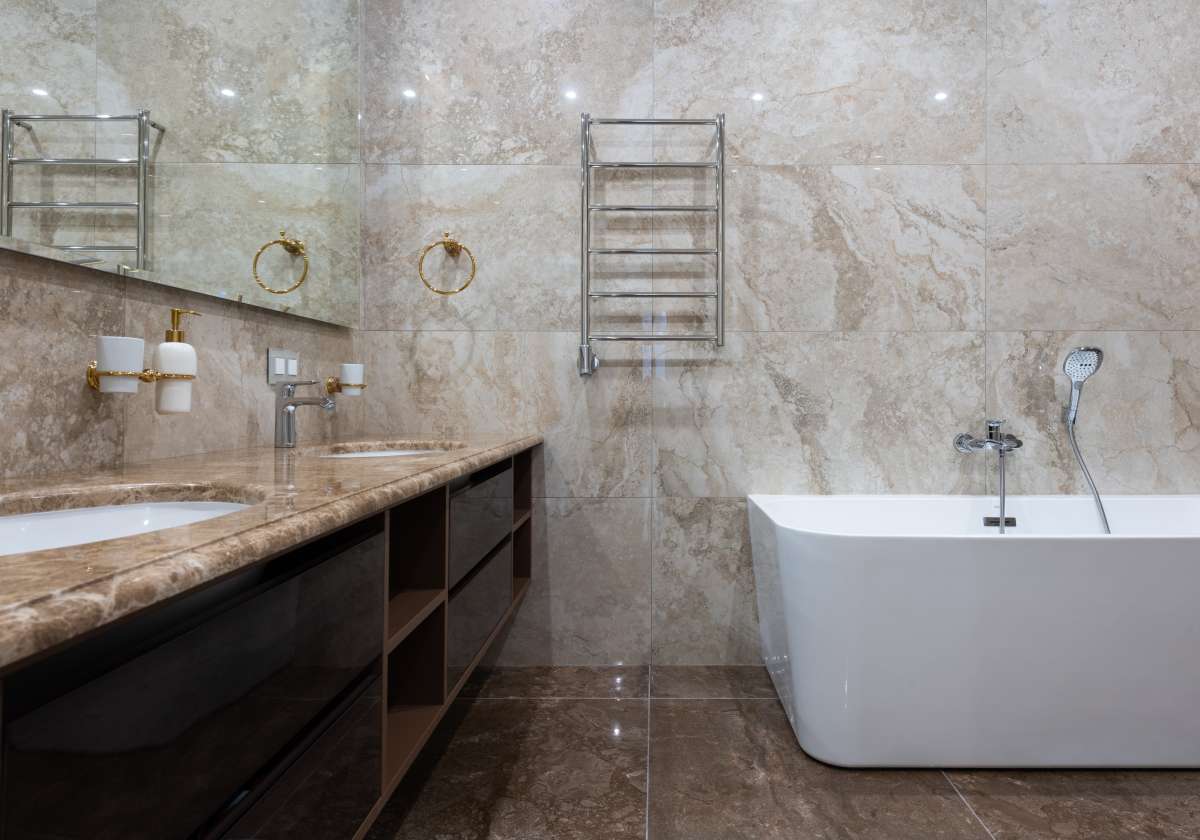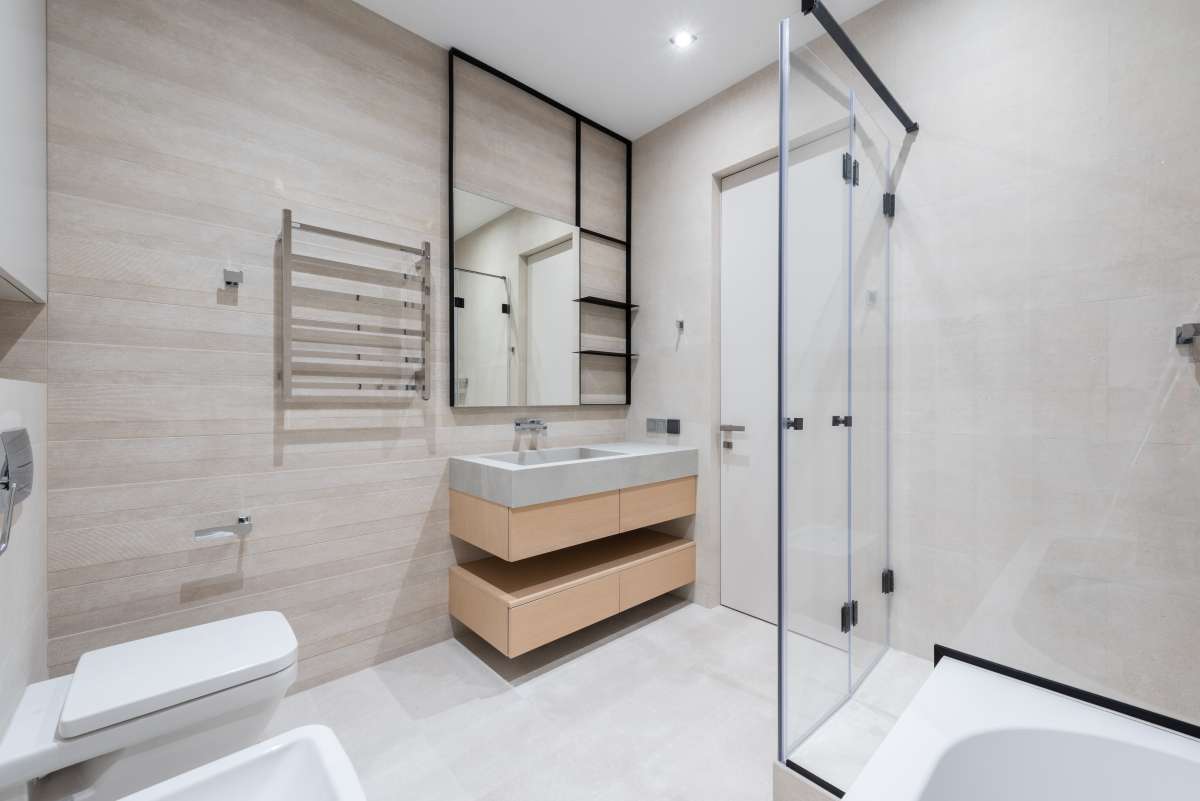Many homeowners choose porcelain tiles due to their durability, water resistance, and aesthetic appeal. However, a common question is whether or not porcelain tiles need to be sealed.
The answer depends on several factors, including the type of porcelain tile, its finish, and where it will be installed. This article will discuss the pros and cons of sealing porcelain tiles to help you decide if it’s necessary for your situation.
Let’s get straight to the point.
Whether porcelain tiles need sealing depends on the type. Glazed porcelain tiles don’t require sealing due to their protective finish.
Polished porcelain, on the other hand, benefits from sealing to protect against stains. Textured tiles may be sealed to ease cleaning, while low-quality tiles should be sealed to prevent moisture damage.
Sealing offers advantages like stain protection, easier cleaning, and extended lifespan, but it is only sometimes necessary. High-quality tiles may not need it, and improper sealing can cause surface residue or dull the finish.
Types Of Porcelain Tiles And Their Sealing Needs
Understanding the different types of porcelain tiles and their specific characteristics is important to determine whether or not your tiles need to be sealed.

1. Glazed Porcelain Tiles
Glazed porcelain tiles have a smooth, protective finish applied during manufacturing to seal the surface. This glaze enhances the tile’s appearance and creates a non-porous surface that naturally resists moisture, stains, and dirt.
Due to their durability and low maintenance, these tiles are widely used in areas prone to spills, such as kitchens and bathrooms. The protective glaze acts as a sealant, meaning additional sealing is usually unnecessary.
- Ideal for areas with high moisture exposure (e.g., kitchens and bathrooms).
- Already stain-resistant due to the glaze.
- Low maintenance; regular cleaning suffices.
- Avoid harsh chemicals that may damage the glaze over time.
2. Polished Porcelain Tiles
Although polished porcelain tiles are highly desirable for their glossy and reflective finish, the polishing process opens microscopic pores on the surface, leaving the tile vulnerable to stains and dirt penetration.
Sealing polished porcelain tiles is often recommended to close these pores, offering extra protection and ensuring the tiles retain their elegant look over time. Regular re-sealing may also be necessary to maintain this protective barrier, particularly in high-traffic or moisture-prone areas.
- The polishing process exposes microscopic pores.
- More susceptible to stains, especially from liquids like wine or coffee.
- Requires sealing to maintain shine and protect against grime.
- Re-sealing every couple of years can ensure long-lasting protection.
3. Textured Porcelain Tiles
Textured porcelain tiles are designed with slip resistance in mind, making them perfect for outdoor areas, bathrooms, or high-traffic zones. However, uneven surfaces trap dirt, making cleaning more labour-intensive.
While these tiles generally have a durable surface that may not require sealing, applying a sealer can help make cleaning easier by preventing dirt from settling deep into the grooves. Sealing is often optional but can extend the tile’s lifespan and ease maintenance.
- Slip-resistant surface, ideal for outdoor spaces or wet areas.
- More difficult to clean due to the uneven surface.
- Sealing can make it easier to remove dirt and grime.
- Optional sealing depends on cleaning preferences and tile location.
4. Low-Quality Porcelain Tiles
Low-quality porcelain tiles, often found in budget ranges, can have a more porous structure than high-grade options. These tiles may absorb water and stains more easily, which can lead to long-term damage or discolouration.
Sealing these tiles can be essential to provide adequate protection and enhance their lifespan. It is important to check the tile’s porosity with the manufacturer and whether sealing is recommended to prevent mould, mildew, or water infiltration.
- More porous than high-quality tiles, leading to greater absorption.
- Sealing can prevent moisture damage and staining.
- Ideal for budget-conscious projects but may need extra care.
- Always consult the manufacturer about the need for sealing.
Pros Of Sealing Porcelain Tiles
Sealing porcelain tiles can offer certain benefits, especially in specific situations. Let’s examine the advantages of applying a sealant.
Protection Against Stains
Porcelain tiles, especially those with a polished finish, can have microscopic pores that trap dirt, liquids, and even oils. Sealing these tiles creates a protective barrier, reducing the likelihood of stains penetrating the tile’s surface.
This is especially beneficial in areas like kitchens, where spills from food and drinks are common, or bathrooms, where water exposure is frequent.
- Sealant protects against acidic spills like wine, vinegar, or citrus juices.
- Prevents discolouration from prolonged exposure to dirt and moisture.
- It can reduce the appearance of minor scratches or scuffs by filling microscopic surface irregularities.
Easier Cleaning For Textured Tiles
Textured porcelain tiles are popular in high-traffic areas due to their slip-resistant properties. However, the very texture that makes them practical can make them more difficult to clean.
A sealant helps smooth the surface without eliminating the texture, preventing dirt and grime from embedding in the grooves and ridges.
- Reduces the amount of scrubbing needed to remove stubborn dirt.
- Helps prevent the growth of mould and mildew in damp environments.
- Ensures that even textured tiles maintain their aesthetic over time with less frequent deep cleaning.
Enhanced Longevity For Low-Quality Tiles
Not all porcelain tiles are created equal, and lower-quality varieties may have a higher porosity, making them more susceptible to moisture absorption and surface wear.
Sealing these tiles can protect against water damage and degradation, helping them last longer and maintain their appearance.
- Reduces the risk of tiles cracking or becoming brittle due to moisture infiltration.
- Protects against fading and discolouration in outdoor installations or sun-exposed areas.
- Minimises damage from chemical cleaners, which can be harsher on lower-quality tiles.

Safeguarding Porous Grout Joints
Grout, often more porous than the tiles, is highly susceptible to absorbing liquids, dirt, and even bacteria.
Sealing both the tiles and the grout creates a moisture-resistant barrier that keeps the grout looking cleaner and prevents damage from spills, particularly in showers, bathrooms, and kitchens.
- Reduces the likelihood of grout lines darkening over time due to water exposure.
- Helps prevent mold and mildew from growing in damp areas, especially grout lines.
- Protects grout from cracking due to water infiltration and expansion.
Added Protection In High-Traffic Areas
Due to constant friction, tiles can wear down more quickly in spaces that experience heavy foot traffic, such as hallways, entryways, or commercial environments.
Sealing porcelain tiles in these areas can help prevent surface wear and keep the tiles looking new for longer, even in demanding environments.
- Reduces visible wear patterns in high-traffic areas.
- Helps maintain the original colour and texture of the tiles despite frequent use.
- Adds durability to the surface, making it more resistant to chips and cracks.
Cons Of Sealing Porcelain Tiles
While sealing porcelain tiles has advantages, some downsides should be considered. In many cases, sealing may not be necessary, and in some instances, it can even cause problems.
High-Quality Porcelain Doesn’t Need Sealing
One key factor to consider is the quality of the porcelain tile. High-quality porcelain tiles are dense and non-porous, with an absorption rate of less than 0.5%.
These tiles do not require sealing because they naturally resist moisture and stains. Applying a sealant to non-porous tiles can be unnecessary and wasteful.
Sealing such tiles can sometimes create a layer on the surface that disrupts their natural properties and can even make them more difficult to clean.
- Sealing high-quality porcelain tiles adds no real protective benefit.
- Sealants can interfere with the tile’s natural ability to repel moisture.
- It can be a financial waste, with little to no return on investment.
Sealing Can Cause Surface Residue
If porcelain tiles are not properly cleaned before sealing, residual dirt, grout haze, or wax can become trapped under the sealer. This can lead to a dull or uneven finish, reducing the tiles’ visual appeal.
Applying too much sealer can leave a sticky residue that attracts dirt and is difficult to remove. This diminishes the floor’s overall aesthetic and makes it more labour-intensive to clean in the future.
- Trapped dirt or dust can create long-lasting blemishes.
- Excess sealant can create a sticky surface that attracts dirt.
- Over-application may require costly removal or repairs.
Sealer May Dull Polished Tiles
Polished porcelain tiles are often chosen for their glossy, reflective surface. However, applying a sealant can dull this finish, making the tiles look less attractive.
If not applied correctly, the sealant can create a cloudy or streaky appearance. This can be particularly problematic in large open spaces where the shine of the tiles is a key design element.
- Sealing polished tiles reduces their natural gloss and shine.
- A streaky or cloudy appearance can develop if the application is uneven.
- The aesthetic appeal of polished tiles may be permanently altered if the sealer cannot be removed.
Maintenance And Reapplication
Sealing porcelain tiles is not a one-time task. Over time, the sealant can wear off, especially in high-traffic areas or locations exposed to frequent moisture.
This means the tiles may need to be resealed periodically, adding to the overall maintenance required. Failure to reseal the tiles can leave them vulnerable to stains and damage, while over-application of sealer can create build-up and surface discolouration.
- Sealants need reapplication over time, especially in high-traffic areas.
- Tiles may become vulnerable to stains and damage if sealant wears off.
- Homeowners may need to follow a regular resealing schedule to maintain protection.
Conclusion
Whether or not to seal porcelain tiles depends on the type, its finish, and the specific area where they’re installed. High-quality glazed porcelain tiles generally don’t require sealing due to their natural non-porosity, while polished, textured, or lower-quality tiles can benefit from the added protection sealants provide.
Sealing can prevent stains, make cleaning easier, and extend the longevity of tiles, especially in high-traffic or moisture-prone areas. However, unnecessary sealing may lead to surface residue or dullness, particularly on high-gloss tiles.
Before deciding, consider the characteristics of your tiles, the environment they will be in, and the potential benefits versus the drawbacks of sealing. With the right approach, you can ensure your porcelain tiles remain durable, beautiful, and easy to maintain for years.
FAQs About Porcelain Tiles
What Are Porcelain Tiles Made Of?
Porcelain tiles are made from a fine mixture of clay and other natural materials, fired at high temperatures to create a dense, durable surface. They are often more refined than standard ceramic tiles, making them harder, less porous, and more resistant to wear and water.
Can Porcelain Tiles Be Used Outdoors?
Yes, porcelain tiles are suitable for outdoor use as they are resistant to frost, heat, and UV radiation.
Can Porcelain Tiles Be Cut?
Porcelain tiles can be cut using a tile cutter, wet saw, or angle grinder with a diamond blade. A wet saw is recommended to reduce the risk of chipping or breaking.
Can Porcelain Tiles Be Used On Walls?
Yes, porcelain tiles can be used on walls, and they are particularly useful in areas that require high durability and moisture resistance, such as showers and backsplashes.
Are Porcelain Tiles Slippery?
Porcelain tiles can be slippery, particularly when wet. However, they are available in various finishes, including matte and textured surfaces, that can increase slip resistance.

